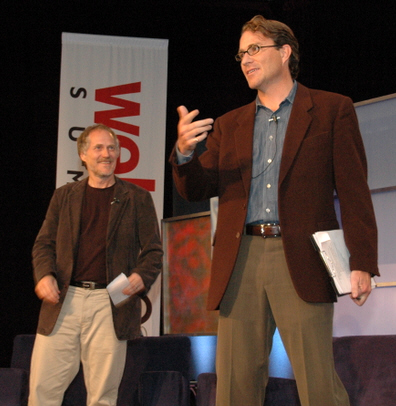Google CEO Eric Schmidt: We would never trap user data

John Battelle and Tim O’Reilly kicked off the industry heavyweight portion of the Web 2.0 Summit with a few remarks about Web 2.0 and the theme of the event, disruption and opportunity.
“Web 2.0 is about harnessing the network effect, which gets better the more people use them,” O’Reilly said. “It could also be called user self-service. This is the start of the real disruption, with asymmetrical competition from user self service.” As an example, Craigslist can be a big player with a few dozen employees.

“We are starting to see how this is becoming a platform game. A platform beats and application every time….Even though we have the wonderful bubbling up of user generated content, it is the beginning of Web 2.0, not the end. Web 2.0 of next year will be very different than this year.
Hopefully it won’t be called Web 3.0. We need at least another five years to play out Web 2.0.
Google CEO Eric Schmidt was the first interview of the afternoon. Battelle started by asking why did Google bought YouTube. "YouTube was growing faster [than Google Video] and video became fundamental data type on the Internet, so that’s why we bought them.," Schmidt said. He expects to maintain YouTube as a separate property, and pointed to its ideas around community as a reason. "The underlying draw is to see what users are doing and have computers suggest related or adjacent content. It is a whole new paradigm and important to users."
Schmidt was asked about copyright issues related to YouTube and paying off media companies. "We have visited with as many media companies as we can," Schmidt said. "We have to respect copy right." He went on to say that the rights clearing process and monetiziation are complex issues, and Google is working on models as to how to monetize copyrighted content.
Battelle suggested that Google has unfair advantage in pricing deals, such as with MySpace and YouTube. "We build a very good targeting engine and a lot of business success has come from that. We run the company around the users--so as long as we are respecting the rights of end users and make sure we don’t do anything against their interest, we are fine," Schmidt said. He noted that history has shown that the downfall of companies can be doing things for their own self interest. "We would never trap user data," he said.
Schmidt was asked if users could get all of their search history and export it to Yahoo. "We would like to do that, as long as it is authenticated....If users can switch it keeps us honest."
Schmidt described the transition in platforms as a major shift. Software running on a datacenter that is running 24x7 is more reliable, he said, and the architecture transition to LAMP and REST will enable an era of huge massive server farms that are fundamentally more reliable than what they replace. "It’s a big change and means users can use other devices, such as mobile phones. It's a real change in the paradigm." He allowed that there will be many winners.
On the subject of office suites, Schmidt played the semantic game, claiming that Google is developing applications for just "casual" use. "We don’t call it an office suite. It's not targeted at the [Microsoft] Office--we never made that claim. For many people, it would be just as easy to have computers in the cloud store information you use every day." Data in the cloud should be more searchable and enable more rapid sharing, he added. "We embarked on a strategy to build apps that are search centric and very sharable....as something use in normal life. We are not arguing it is an [Microsoft] Office replacement, but a different way of manage information. I don’t think it replaces Office. The focus we have is casual sharing and usage, and it has one benefit--it is free.
I don't know how Schmidt defines casual, but it could be products that lack the industrial strength of Microsoft Office, but are evolving in that direction...quickly.
Schmidt said that one of projects Google is engage in is figuring out the underlying architecture for building Web applications. Perhaps that is why Google bought JotSpot.
One of the limits of the current Web application architecture is the lack of offline support. "It's possible that the new network architecture will always be presumed to be around and a disk is optional. It is going to happen, at least in the Western world. It looks like ubiquitous connectivity is near. For the near term, cache proxy on a PC is the obvious technical solution, Schmidt said.